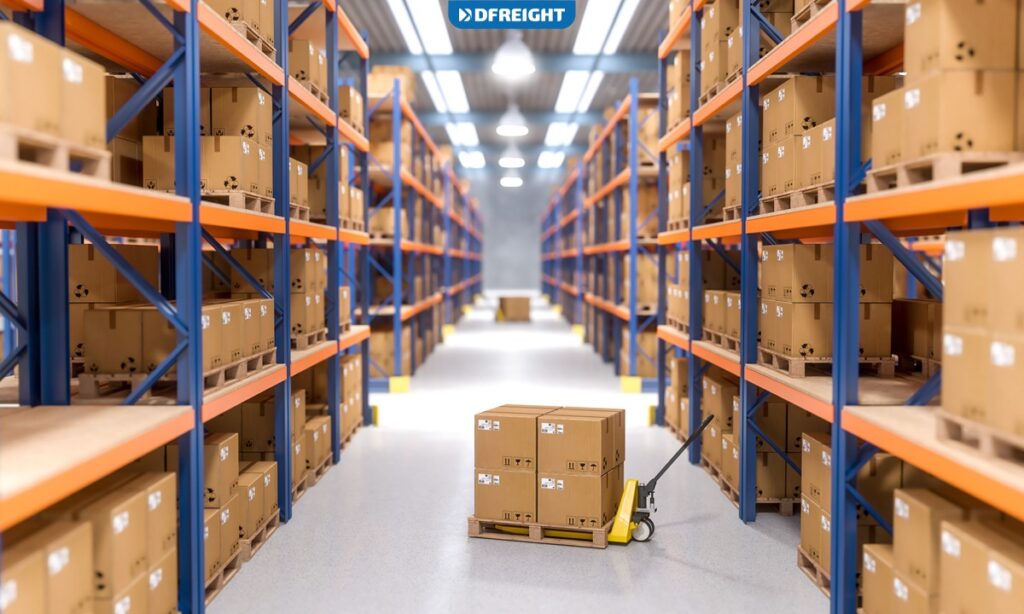Better Warehouses in Pakistan can Increase Trade

Introduction
Warehousing is a critical component of the logistics and supply chain infrastructure that significantly impacts trade. In Pakistan, the importance of better warehouses in Pakistan cannot be overstated as they play a pivotal role in enhancing trade efficiency, reducing costs, and improving overall supply chain management. This article explores the multifaceted ways in which improved warehousing facilities can boost trade in Pakistan, detailing the benefits and challenges associated with this crucial aspect of logistics.
The Role of Warehousing in Trade
Warehousing serves as the backbone of trade, providing the necessary storage and handling solutions for goods before they reach their final destination. Effective warehousing ensures that products are stored safely, preserved in optimal conditions, and readily available for distribution. This, in turn, helps in maintaining the flow of goods, minimizing delays, and ensuring timely delivery.
Benefits of Efficient Warehousing for Trade
- Improved Inventory Management
Better warehouses in Pakistan equipped with advanced inventory management systems allow for real-time tracking of goods. This leads to more accurate inventory levels, reducing the risk of stockouts and overstocking. Efficient inventory management helps businesses meet customer demand promptly, enhancing customer satisfaction and loyalty.
- Reduced Operational Costs
Modern warehousing solutions incorporate automation and optimized storage techniques that reduce labor costs and improve space utilization. Automated systems for sorting, picking, and packing streamline operations, resulting in significant cost savings. These savings can be passed on to customers or reinvested into the business, fostering growth.
- Enhanced Supply Chain Efficiency
Efficient warehouses contribute to a smoother supply chain by reducing the time goods spend in storage and transit. This improved flow of goods minimizes delays and ensures that products reach the market faster. A responsive supply chain enhances a business’s ability to adapt to market changes and meet customer needs effectively.
- Minimized Product Damage and Loss
Advanced warehousing facilities are designed to handle goods with care, minimizing the risk of damage and loss. Proper storage conditions, such as temperature and humidity control, are maintained to preserve the quality of perishable goods. This reduces waste and ensures that customers receive products in optimal condition.
- Better Demand Forecasting
With accurate data collection and analysis enabled by modern warehousing technologies, businesses can better forecast demand. This predictive capability allows for more efficient production planning and inventory management, aligning supply with market demand and avoiding excess inventory costs.
The Current State of Warehousing in Pakistan
Pakistan’s warehousing sector has seen significant improvements over the years, but there is still considerable room for growth. Traditional warehousing practices, characterized by manual processes and inadequate infrastructure, are gradually being replaced by modern, automated facilities. However, challenges such as insufficient investment, lack of skilled labor, and regulatory hurdles persist.
Case Studies: Successful Warehousing Models in Pakistan
- Lasani Logistics’ Warehousing Solutions
Lasani Logistics is a prime example of how better warehousing can enhance trade in Pakistan. With state-of-the-art facilities equipped with advanced inventory management systems and automation, Lasani Logistics has significantly reduced operational costs and improved supply chain efficiency for its clients. Their focus on maintaining optimal storage conditions has minimized product damage, ensuring high-quality deliveries.
- Cold Chain Warehousing for Perishable Goods
The cold chain warehousing sector has shown remarkable progress, particularly in the storage and distribution of perishable goods. Companies investing in temperature-controlled warehouses have managed to reduce spoilage and extend the shelf life of products. This has not only increased the profitability of businesses dealing in perishable goods but also boosted the overall trade volume of these products.
The Impact of Technology on Warehousing
The integration of technology in warehousing has revolutionized the logistics industry. Technologies such as the Internet of Things (IoT), Artificial Intelligence (AI), and Blockchain are being increasingly adopted to enhance warehouse operations.
- IoT for Real-Time Tracking
IoT devices enable real-time tracking of goods, providing valuable data on their location, condition, and movement. This transparency helps in better inventory management and ensures that any issues are promptly addressed.
- AI for Predictive Analytics
AI-powered predictive analytics help in demand forecasting, inventory optimization, and efficient resource allocation. By analyzing historical data and market trends, AI provides actionable insights that drive better decision-making.
- Blockchain for Supply Chain Transparency
Blockchain technology enhances supply chain transparency and security by providing an immutable record of transactions. This ensures that all parties involved have access to accurate and reliable information, reducing the risk of fraud and errors.
Challenges Facing the Warehousing Sector in Pakistan
Despite the benefits, the warehousing sector in Pakistan faces several challenges that hinder its full potential.
- Infrastructure Deficiencies
Many warehouses in Pakistan still lack the necessary infrastructure to support efficient operations. Poor road networks, inadequate power supply, and outdated facilities are common issues that need to be addressed.
- Skilled Labor Shortage
There is a shortage of skilled labor trained in modern warehousing practices. This gap affects the implementation of advanced technologies and efficient management of warehouse operations.
- Regulatory Hurdles
Complex regulatory frameworks and bureaucratic red tape can delay the establishment and operation of new warehousing facilities. Streamlining these processes is essential for fostering growth in the sector.
Strategies for Improving Warehousing in Pakistan
To overcome these challenges and enhance the warehousing sector, several strategies can be implemented.
- Investing in Infrastructure
Investing in modern infrastructure is crucial for developing efficient warehousing facilities. This includes building better roads, ensuring reliable power supply, and upgrading existing warehouses with advanced technologies.
- Training and Development
Providing training programs for warehouse staff can bridge the skill gap and improve the overall efficiency of warehouse operations. Collaboration with educational institutions and industry experts can help develop relevant training modules.
- Policy Reforms
Simplifying regulatory processes and offering incentives for investment in the warehousing sector can attract more businesses to upgrade their facilities. Policy reforms that support technological adoption and infrastructure development are essential.
Future Trends in Warehousing
The future of warehousing in Pakistan looks promising with the continued adoption of advanced technologies and innovative practices.
- Automated Warehousing
Automation will play a key role in the future of warehousing, with robots and automated systems handling tasks such as sorting, picking, and packing. This will significantly reduce labor costs and improve efficiency.
- Sustainable Warehousing
Sustainability will become a major focus, with warehouses adopting eco-friendly practices such as energy-efficient lighting, renewable energy sources, and waste reduction initiatives. Sustainable warehousing not only benefits the environment but also enhances the reputation of businesses.
- E-Commerce and Omni-Channel Logistics
The rise of e-commerce will drive the demand for efficient warehousing solutions. Warehouses will need to adapt to the fast-paced nature of online retail, ensuring quick turnaround times and seamless order fulfillment.
Conclusion
Better warehouses in Pakistan are instrumental in increasing trade in Pakistan by improving supply chain efficiency, reducing operational costs, and enhancing customer satisfaction. Despite the challenges, the continued investment in infrastructure, technology, and skilled labor will drive the growth of the warehousing sector. As Pakistan embraces modern warehousing solutions, it will be well-positioned to boost its trade volumes and achieve sustainable economic growth.
FAQs
How do better warehouses in Pakistan contribute to trade efficiency?
Better warehouses in Pakistan improve trade efficiency by enhancing inventory management, reducing operational costs, and minimizing delays in the supply chain. They ensure goods are stored safely and are readily available for distribution, facilitating a smoother flow of trade.
What technologies are transforming warehousing in Pakistan?
Technologies such as the Internet of Things (IoT), Artificial Intelligence (AI), and Blockchain are transforming warehousing in Pakistan. These technologies enable real-time tracking, predictive analytics, and supply chain transparency, leading to more efficient and reliable operations.
What are the main challenges facing the warehousing sector in Pakistan?
The main challenges include infrastructure deficiencies, a shortage of skilled labor, and regulatory hurdles. These issues hinder the full potential of the warehousing sector and need to be addressed to enhance trade.
How can Pakistan improve its warehousing sector?
Investing in modern infrastructure, providing training programs for warehouse staff, and implementing policy reforms to simplify regulatory processes can significantly improve the warehousing sector in Pakistan.
What is the future of Better Warehouses in Pakistan?
The future of warehousing in Pakistan includes increased automation, a focus on sustainability, and adaptation to the demands of e-commerce and omni-channel logistics. These trends will drive efficiency and support the growth of trade.
Why is sustainable warehousing important?
Sustainable warehousing is important because it reduces the environmental impact of logistics operations. It involves adopting eco-friendly practices, such as using energy-efficient lighting and renewable energy sources, which enhance the reputation of businesses and contribute to environmental conservation.
If you want to see our services please follow the link for more updates and News please follow our Facebook Page


